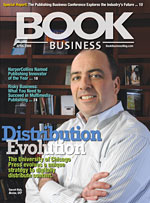The business of books in the digital age
 Along with nearly every other facet of life, in the last decade the digital revolution has transformed the book publishing industry. As North America’s largest university press, Chicago has been one of the leaders in advancing the use of digital technology in publishing—a fact acknowledged in the cover story of this month’s Book Business magazine. Touching on everything from our short-run digital printing program, to the digital publishing services offered by BiblioVault, our digital content repository, Book Business‘s James Sturdivant talks to UCP director Garrett Kiely and Chicago Digital Distribution Center manager Jeanne Weinkle to learn how Chicago has extended its digital publishing initiatives into the twenty-first century. James Sturdivant writes for Book Business:
Along with nearly every other facet of life, in the last decade the digital revolution has transformed the book publishing industry. As North America’s largest university press, Chicago has been one of the leaders in advancing the use of digital technology in publishing—a fact acknowledged in the cover story of this month’s Book Business magazine. Touching on everything from our short-run digital printing program, to the digital publishing services offered by BiblioVault, our digital content repository, Book Business‘s James Sturdivant talks to UCP director Garrett Kiely and Chicago Digital Distribution Center manager Jeanne Weinkle to learn how Chicago has extended its digital publishing initiatives into the twenty-first century. James Sturdivant writes for Book Business:
Garrett Kiely [is] a 20-year industry veteran who came on as the UCP’s 15th director in September 2007. Kiely arrived after an eight-year stint as president of Palgrave Macmillan, where he oversaw e-book conversion projects and other pioneering digital initiatives for a division focused on scholarly and reference titles.
Such experience is crucial to the press’s innovative strategy for content distribution. The press offers print-on-demand and digital distribution to a range of academic publishers through its Chicago Distribution Services, positioning itself as the entity best able to serve the needs of noncommercial academic publishers.
“We provide a very good service,” Kiely says. “Random House does the best trade distribution, and Chicago is the best university distributor. That’s pretty good company to be in.”
“For publishers [who work with us] here, I can tell you [that] right away they never have to manage that inventory again,” [says Jeanne Weinkle, manager of the Chicago Digital Distribution Center]. “There’s no worry about shipping. It’s just a nice flow, a nice life cycle.” In addition to the 180 new books and approximately 70 paperback reprints published yearly by the UCP, [Chicago Distribution Services] runs fulfillment services for more than 50 outside presses.
Weinkle refers to her clients as “a community of like-minded publishers who have similar financial challenges”—among them, the shifting market for academic materials as university libraries scale back on print purchases, and, in some cases, staff cutbacks that have made it difficult to develop digital distribution and marketing services in-house. … We definitely make a profit here, but that’s not what it’s about. It’s about keeping the books alive,” she says.
To learn more about the press’s digital services and initiatives, or for those simply interested in how digital technology is affecting the world of academic publishing, read the rest of article on the Book Business website, and see the variety of services offered by the Chicago Distribution Center.